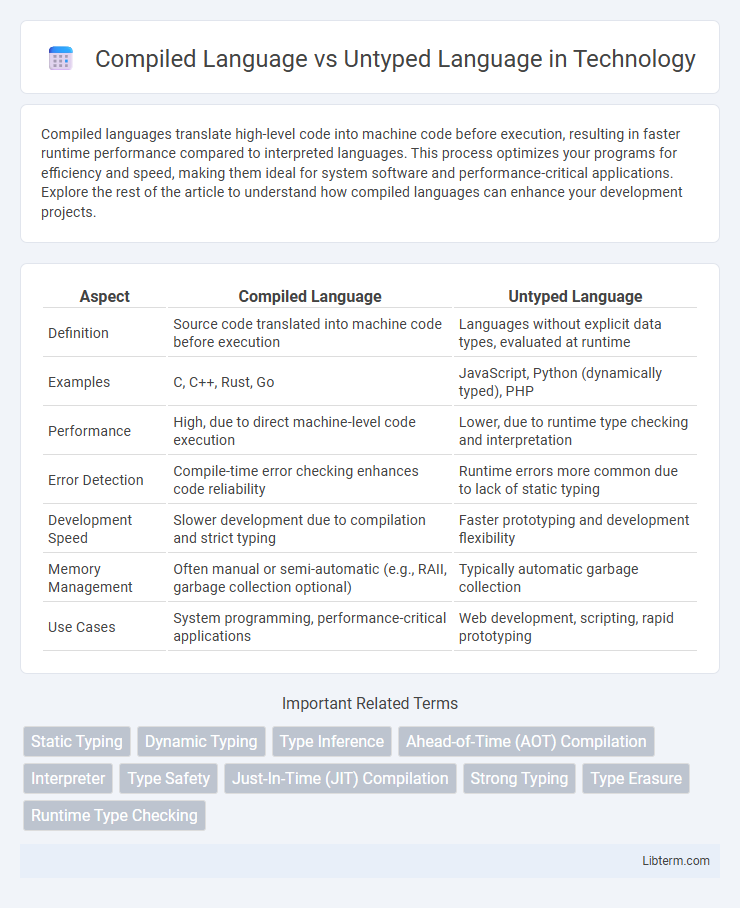Compiled languages translate high-level code into machine code before execution, resulting in faster runtime performance compared to interpreted languages. This process optimizes your programs for efficiency and speed, making them ideal for system software and performance-critical applications. Explore the rest of the article to understand how compiled languages can enhance your development projects.
Table of Comparison
| Aspect | Compiled Language | Untyped Language |
|---|---|---|
| Definition | Source code translated into machine code before execution | Languages without explicit data types, evaluated at runtime |
| Examples | C, C++, Rust, Go | JavaScript, Python (dynamically typed), PHP |
| Performance | High, due to direct machine-level code execution | Lower, due to runtime type checking and interpretation |
| Error Detection | Compile-time error checking enhances code reliability | Runtime errors more common due to lack of static typing |
| Development Speed | Slower development due to compilation and strict typing | Faster prototyping and development flexibility |
| Memory Management | Often manual or semi-automatic (e.g., RAII, garbage collection optional) | Typically automatic garbage collection |
| Use Cases | System programming, performance-critical applications | Web development, scripting, rapid prototyping |
Introduction to Compiled and Untyped Languages
Compiled languages, such as C++ and Rust, transform source code into machine code before execution, offering optimized performance and early error detection. Untyped languages like JavaScript and Python do not enforce strict data types, enabling rapid development and flexibility but potentially leading to runtime type errors. Understanding these core differences helps developers choose the appropriate language paradigm based on project requirements and resource constraints.
Defining Compiled Languages
Compiled languages transform source code into machine code through a compiler before execution, enabling faster runtime performance and optimized resource management. These languages, such as C, C++, and Rust, enforce strict type checking at compile time to catch errors early and improve code reliability. In contrast, untyped languages like JavaScript or Python often rely on interpreters and dynamic typing, which can introduce runtime overhead and delayed error detection.
Understanding Untyped Languages
Untyped languages operate without explicit data type declarations, allowing variables to hold values of any type and enabling flexible programming patterns often used in scripting and rapid prototyping. This dynamic typing model introduces runtime type checking, which can simplify development but may increase the risk of runtime errors compared to statically typed, compiled languages. Understanding untyped languages like JavaScript or Python involves appreciating their adaptability and trade-offs in performance and error detection relative to compiled languages such as C++ or Rust.
Key Differences Between Compilation and Typing
Compiled languages translate source code into machine code before execution, optimizing for performance and early error detection through static type checking. Untyped languages, often interpreted or dynamically typed, do not enforce type constraints at compile time, enabling greater flexibility but potentially increasing runtime errors. Key differences include compilation timing, type enforcement, error detection stages, and execution speed, with compiled languages generally providing faster execution and stronger type safety.
Performance: Compiled vs. Untyped Languages
Compiled languages such as C++ and Rust perform faster execution by translating code directly into machine language before runtime, enabling optimized resource management and quicker processing. Untyped languages like JavaScript and Python often rely on interpretive or just-in-time compilation techniques, which introduce overhead and reduce performance efficiency. The absence of static type enforcement in untyped languages leads to increased runtime checks, further impacting execution speed compared to compiled, statically-typed counterparts.
Type Safety and Error Detection
Compiled languages enforce type safety through static type checking, enabling earlier error detection during the compilation process, which minimizes runtime errors and enhances program reliability. Untyped languages lack strict type constraints, resulting in greater flexibility but increased risk of type-related errors that often surface only at runtime. This trade-off emphasizes the importance of type safety in compiled languages for robust error detection and prevention.
Development Speed and Productivity
Compiled languages, such as C++ and Rust, often require more time upfront due to strict typing and compilation processes but provide faster execution and early error detection, enhancing long-term productivity. Untyped languages like JavaScript and Python offer greater flexibility with dynamic typing, enabling rapid prototyping and faster development cycles, which accelerates initial development speed. However, the lack of static type checks in untyped languages can lead to runtime errors, potentially reducing productivity as projects scale and require more debugging.
Use Cases and Industry Applications
Compiled languages like C++ and Rust excel in system-level programming, game development, and performance-critical applications due to their direct machine code translation and strong type systems. Untyped languages, exemplified by JavaScript and Python, are preferred in rapid prototyping, web development, and data science where flexibility and dynamic typing enable faster iteration and easier handling of diverse data formats. Industries such as finance and telecommunications favor compiled languages for efficiency and safety, whereas startups and research sectors leverage untyped languages for agility and adaptability.
Pros and Cons of Compiled and Untyped Languages
Compiled languages offer faster execution speed and better performance due to direct translation into machine code but often require longer development cycles because of compilation steps and stricter type enforcement. Untyped languages, such as dynamically typed scripting languages, provide greater flexibility and faster prototyping by allowing variable types to change at runtime but may introduce runtime errors and less optimized performance. Developers must weigh the trade-offs between execution efficiency and development agility when choosing between compiled and untyped languages.
Choosing the Right Language for Your Project
Choosing the right language for your project depends on performance requirements and type safety needs. Compiled languages like C++ and Rust offer faster execution and early error detection through static typing, making them ideal for system-level and performance-critical applications. Untyped languages such as JavaScript and Python provide greater flexibility and rapid development, suited for scripting, prototyping, and applications where dynamic typing accelerates coding speed.
Compiled Language Infographic

 libterm.com
libterm.com